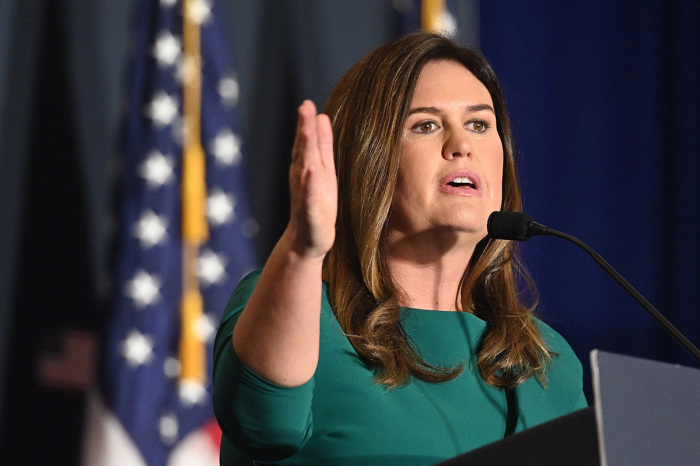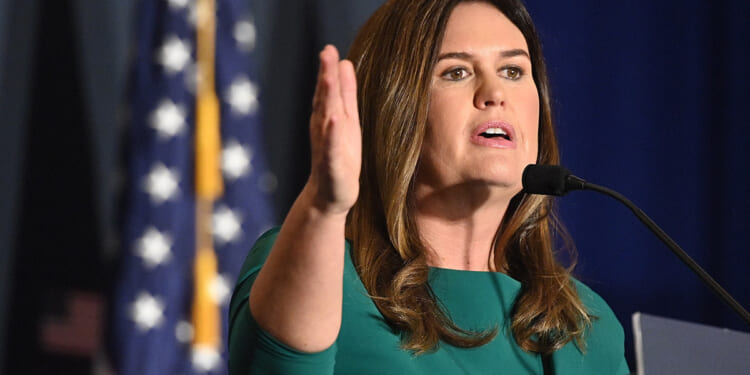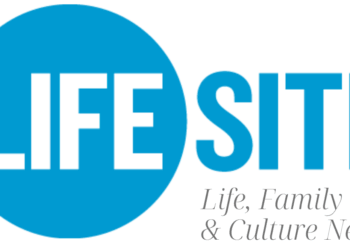
Arkansas Gov. Sarah Huckabee Sanders says she is offering residents a “hand up, not a handout” through the state’s new 10:33 Initiative, which derives its name from the Gospel of Luke and vows to uplift Arkansans in crisis by connecting them with local faith and community partners who can meet their needs.
The 10:33 Initiative pilot program takes its name from Luke 10:33, “But a Samaritan, as he traveled, came where the man was; and when he saw him, he took pity on him.”
Organized by Sanders’ Faith-Based Initiatives office, the 12-month pilot program will take place in Pulaski, Union and Pope counties and will help residents create a plan to address their needs — such as securing housing, transportation, employment or childcare.
Sanders believes the initiative embodies the compassion the Good Samaritan showed to a stranger and serves as a reminder of one’s duty to help their neighbor, regardless of their background or any disagreements.
“The purpose of that story, and what we want to be the driver behind this initiative, is looking for a way to bring our state together to help our most vulnerable citizens and lift them up at a time when they can really use a little bit of help,” the Republican governor told The Christian Post.
In a statement earlier this month, Sanders promised that the 10:33 Initiative “isn’t another government welfare program.” Instead, she said it’s “a groundbreaking project carefully curated to give Arkansans a hand up, not a handout.”
The initiative is conducted in partnership with several other entities and donors, including the White House Faith Office, the Arkansas Department of Human Services, and the Arkansas Department of Commerce.
Sanders stated that most of the 10:33 Initiative is privately funded and utilizes the Hope Hub software technology, which was already in place due to the Arkansas nonprofit Restore Hope.
The Hope Hub program, which is already used in 19 Arkansas counties, connects individuals with service provider agencies after assessing their needs. Restore Hope, which Sanders referred to as a “great partner,” had already built a resource and managed it well, so there was no need to spend money on constructing another one.
Sanders believes that a project like the 10:33 Initiative is better for Arkansas because government programs “only complete a piece of the puzzle,” and she argued that the 10:33 Initiative takes things to “the next level.”
“Again, that person’s now coming, and they’re not just getting food stamps; it’s about how can we connect you with some of our community partners who may help you if you need a car to get to a job, housing, or whatever it looks like?” Sanders asked. “How can we help you get on your own two feet so that you’re no longer dependent on government services? And what are all the pieces to your puzzle that we can help bring together in one place to help really address needs and move you forward?”
“The goal should never be to trap and keep people on a government program,” the Arkansas governor added, calling it the “definition of failure” when an able-bodied person never leaves the system.
“That’s not the goal. The goal is to give them a hand up, not a handout, so that they can, eventually, have a foundation to stand on their own and not be reliant on the government system,” Sanders continued.
“If there are people who can’t work or who have significant challenges, we always want them to have a place to go,” she added. “But people who have the ability, we really want them to be able to get out there on their own and, ideally, pay it forward down the line.”
One critic of the 10:33 Initiative, Rev. Clint Schnekloth of the Good Shepherd Lutheran Church in Fayetteville, Arkansas, expressed concern in an Oct. 6 Substack post that a program like this one usually comes with cuts to public support systems.
The pastor also fears that churches are only equipped to offer some assistance to their communities, and they’re not prepared to provide the long-term safety nets that the state or federal government offers.
While the 10:33 Initiative focuses on a faith-based and community approach to helping people with issues like housing or food insecurity, Sanders said this doesn’t mean the program involves cutting any state programs.
“The goal isn’t to cut any state program,” the Republican governor said. “It’s adding more to it by engaging more partners in the process.”
“And I think it is 100% not only the role, but also the biblical calling that Christians and the faith community should be stepping up to help people who need help,” she continued. “And in many cases, they’re already doing this.”
The governor noted that many churches in Arkansas already offer resources such as drug recovery programs, housing networks and after-school programs — they just haven’t been working with the state to do it, Sanders said.
Reflecting on her desire to serve people, Sanders remembered growing up as the daughter of a pastor and the former governor of Arkansas, Mike Huckabee, who is currently the U.S. ambassador to Israel.
“I grew up with a dad as a pastor and saw the way that my own family and my parents engaged in the community,” she said. “The reason that I ran for office is because I love people. I have a commitment to service, and that’s a similar feeling that you’ll find in churches across this country.”
“And so, being able to partner those things together and utilize the volunteer base and the resources that our faith community has seems like a no-brainer,” she added.
The Republican governor and former White House press secretary said that she hopes the 10:33 Initiative will have a positive impact on the people of Arkansas and serves as a “blueprint for other states and communities to follow.”
Samantha Kamman is a reporter for The Christian Post. She can be reached at: samantha.kamman@christianpost.com. Follow her on Twitter: @Samantha_Kamman
















